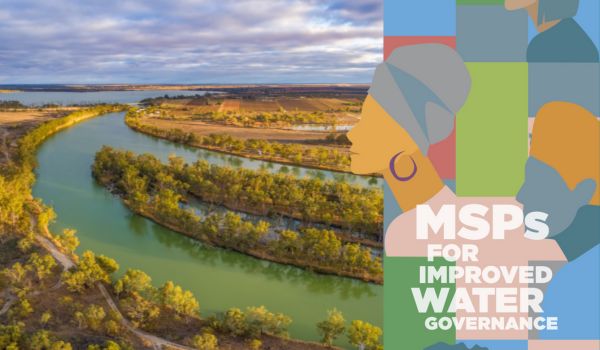The session kicked off with an overview of key findings from the recent GWP publication Multi-stakeholder regional dialogues: pathways for advancing transboundary water cooperation. This publication delves into three distinct cases of regional multi-stakeholder dialogues, each taking place in different parts of the world, namely Eastern Europe, South Asia, and Southern Africa (see right-hand menu). By focusing on these real-world examples, the session aimed to provide a practical understanding of the challenges and opportunities associated with regional dialogues.
The publication also serves as a valuable resource for individuals and organizations engaged in regional water governance and cooperation, providing a roadmap for designing, implementing, and sustaining effective multi-stakeholder dialogues.
Enabling factors
One important enabling factor discussed during the session was the inclusion and role of skilled facilitators. They play a crucial role in ensuring that all relevant stakeholders are involved in the dialogue process and that their voices are heard. While addressing power dynamics and ensuring equitable participation, they also possess the expertise to create a conducive environment that fosters open and constructive discussions.
Another significant enabling factor that emerged from the session was the integration of regional political and economic processes into the dialogue framework. By aligning the dialogue with existing regional priorities and processes, participants can tap into shared goals and strategies, and thereby enhancing the effectiveness and impact of the dialogue. (click on image to enlarge)
South East Europe dialogue
As highlighted by Bo Libert, former regional advisor to the UNECE, presenting the case of the South East Europe dialogue, the process of EU integration was vital in advancing cooperation among the states, where only one country in the region was an EU member at the start of the dialogue. The facilitation of the dialogue by GWP-Mediterranean ensured that there was minimum or no competition among the countries over the shared resource which leveled the playing field and helped to gain their trust.

South Asia dialogue
The session also highlighted the importance of fostering social learning across scales. Participants had a chance to hear first-hand experience from the South Asia dialogue. In her presentation, Christina Leb, Senior Counsel from the World Bank, explored the value of cross-sectoral and cross-country knowledge exchange, emphasizing the need for dialogue processes that enable stakeholders to learn from one another's experiences and best practices. The session underscored the potential of social learning to bridge gaps, build trust, and foster collaborative solutions within and beyond regional boundaries. As underlined by the speaker, regional dialogues work best if the facilitators manage to build them into an existing network of partners and their ongoing activities. (click on image to enlarge)
Southern Africa dialogue
Sustainable financing emerges as another critical enabling factor discussed during the session. While initial funding may come from specific donors or partners, long-term financial sustainability is vital for the continuous operation and growth of regional dialogues. We heard from Annah Ndeketeya that in the case of regional dialogues in the SADC region, diversifying funding sources and leveraging innovative financing mechanisms was the key strategy to ensure the longevity and impact of the dialogue beyond initial stages. She also stressed that mobilizing core funding from regional actors and then using these funds to pick up on additional funding opportunities proved to be very successful. (click on image to enlarge)
Looking ahead - Central America dialogue
Finally, regional transboundary water dialogue in Central America was presented by Emet Herrera from the Ministry of Environment of Panama. The dialogue was initiated and facilitated by the Central American Commission for Environment and Development (CCAD) and GWP Central America with support from GEF IW:LEARN in 2019, and later supported by UNECE Water Convention Secretariat. This dialogue aims to establish a regional community of practice and enhance cooperation among countries for managing transboundary water resources in line with the CCAD’s programme of work and aligning with the Regional Environmental Framework Strategy (ERAM). The Fourth Regional Dialogue on Transboundary Water Resources Management, held in Panamá in June 2022, produced an initial draft of the “Proposal for Regional Guidelines on the Principles of Cooperation for Transboundary Water Management in the SICA Region”. The draft guidelines have been subsequently revised by representatives of the ministries of environment and foreign affairs of the countries that are part of the Central American Integration System (SICA) in October 2022 and are pending official approval.
As highlighted by Emet, some of the challenges addressed by the dialogue were integrating local governments and communities in the border area, from an inclusive, participatory, and sustainable point of view, and establishing a transboundary governance structure that achieves greater articulation in public policy at the transboundary level. (click on image to enlarge)
Transboundary Water Knowledge Exchange Hub
Overall, the session served as a catalyst for knowledge exchange and collaboration, empowering participants to apply the lessons learned and best practices on how to conduct regional multi-stakeholder dialogues shared during the session. By embracing the enabling factors discussed, stakeholders can work together to address water governance challenges, strengthen transboundary water cooperation, and promote integrated water resource management in their respective contexts.
Further post-event conversation on this topic will take place on Transboundary Water Knowledge Exchange Hub via the link. You can also review the recording and speaker presentations shared there. (click on image to enlarge)






